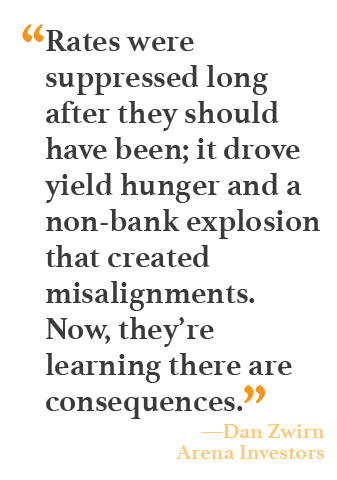A massive wave of corporate distress is pitting struggling companies against their lenders in fights that shape until be meaner than ever.
Desperate companies and their private equity owners are looking to take advantage of years of weakened creditor protection to help reduce their obligations and raise funds after the coronavirus outbreak shut down businesses. Whether through written allowances in loan documents when times were good or simply loopholes in terms of deals, they siphon off collateral and transfer assets while forcing deeply discounted debt swaps on investors, who risk seeing the value of their bonds and loans plummet if they don’t follow through.
Yet fund managers don’t just roll. Credit giants like GSO Capital Partners, BlackRock Inc. and HPS Investment Partners have lined up dozens of lawyers and financial advisers to defend their interests, often finding themselves at odds with each other as they battle for bigger slice of a shrinking cake. As the gloves come off, industry veterans say tensions are higher than they’ve ever seen.
“You’ve got more and more aggressive people holding this stuff, and private equity firms have been playing into every corner of credit deals,” said Dan Zwirn, CEO of Arena Investors, which runs 1 .4 billion dollars. “As people get desperate, there will be many more.”
See also:
The conflicts underline how much the legacy of the last crisis is being felt as the current one unfolds. Relentless interest rate cuts and the Federal Reserve’s quantitative easing have spurred a surge in demand for higher-yielding assets, helping risky companies sell debt with less collateral from lenders. Today, in the midst of a new episode of economic difficulties, the effects of these policies are being felt.
One such fight recently took place between Sinclair Broadcast Group Inc. and its creditors.
Through a subsidiary, the company sold $1.8 billion in unsecured notes last year to fund the acquisition of regional sports networks from Walt Disney Co. Those securities have plunged as the pandemic has left stations without professional sporting events to televise.
Relatively loose provisions in the bond documents encouraged Sinclair to pursue a debt swap which required holders to take 40 percent Haircut and swap into debt secured by company assets.
Late last month, the lenders refused the terms and a group led by Shenkman Capital Management organized to block the exchange. Sinclair’s response was a bad omen: The company said it was evaluating other options, including a possible maneuver that would move the company’s guarantee out of reach of creditors if the exchange offer does not succeed.
The potential moves were “threats” that appeared designed to put pressure on lenders, according to Covenant Review, which called the bond’s outstanding collateral among the weakest it had ever seen.
“Issuers are more aggressive in their approach to debt swaps; they are looking for additional ways to coerce bondholders who have not been interested in participating,” said Scott Josefsberg, an analyst at the debt research firm. “But investors are struggling so far.”
Sinclair finally exchange approximately 3.6% of eligible tickets.
A representative for the broadcaster had no immediate comment, while Shenkman declined to comment beyond confirming his role as head of the creditors’ group.
Sinclair’s exchange offer hasn’t been the only one to anger investors in recent weeks.
Efforts by SM Energy Co. to get creditors to swap their bonds for new securities at 50% to 65% of face value have faced a major setback. While only around 10% of ticket holders agreed to bid last month, the oil and gas driller reached a separate deal with a group of creditors led by BlackRock.
The side deal was designed to support the swap, and the BlackRock-led group secured better terms to swap its debt than what was offered to other creditors. The move infuriated other lenders, who organized with law firm Weil Gotshal & Manges to oppose the deal.
Bondholders who agree to the swap must agree to eliminate nearly all covenants on existing debt, which would hurt anyone who doesn’t participate. The tender deadline has been extended to June 12.
SM Energy, BlackRock and Weil Gotshal & Manges did not respond to requests for comment.
Revlon and Travelport clash heats up
Analysts have been warning investors for years that weakening protections would ultimately have costs as investors ceded more and more ground to borrowers. Yet, despite the recent rise in corporate tensions, a Moody’s Investors Service bond covenant quality gauge remained near an all-time low in April. A similar tracker for loans hit an all-time low in the fourth quarter, according to the most recent data available.
Guarantees from lenders played a major role in Revlon Inc.’s contentious $1.8 billion debt review last month.
Creditors including Brigade Capital Management and HPS had organized to block the company’s refinancing plan because it allowed the company to siphon off collateral and use it to secure new debt. Proponents of the plan included Ares Management Corp. and Angelo Gordon & Co.
 The deal required more than 50% of signed holders to complete. At first, opposing lenders held a lock-up position with a majority of the loan amount remaining to be repaid. But Revlon secured a new $65 million revolving credit facility from the supportive lenders – which the company said was allowed under its covenants – ultimately giving it enough backing to pass the deal.
The deal required more than 50% of signed holders to complete. At first, opposing lenders held a lock-up position with a majority of the loan amount remaining to be repaid. But Revlon secured a new $65 million revolving credit facility from the supportive lenders – which the company said was allowed under its covenants – ultimately giving it enough backing to pass the deal.
Some lenders continue to dispute the transaction, arguing Revlon needed a majority of debt holders in each tranche to agree, and claiming the company breached its covenants when it moved certain intellectual properties to secure a loan $200 million last year, according to people with knowledge. of the material.
Yet all creditors who chose not to participate in the refinancing were downgraded from a first lien claim on the company’s assets to a third lien claim.
“Revlon is strengthening its balance sheet and increasing its liquidity to better address current issues, including Covid-19,” Chief Financial Officer Victoria Dolan said in a statement to Bloomberg. “This group of opposing lenders are trying to block that. We are confident that we will overcome this effort to harm our business.
Representatives for Brigade, HPS, Ares and Angelo Gordon declined to comment.
Transactions involving collateral transfers have been among the most hotly contested between creditors and private equity firms interference to protect their investments.
Last month, Elliott Management Corp. of Paul Singer has become embroiled in a tussle with lenders to global reservations operator Travelport, which Elliott bought last year with Siris Capital Group. The owners transferred intellectual property estimated at over $1 billion to an unrestricted subsidiary, putting it beyond the reach of creditors, to help it raise funds.
The GSO-led lenders demanded that Travelport cancel the transaction for breach of contract agreements and declared the stage in default. The owners, who maintain that it was authorized, told them that they cancel asset transfer if creditors provided about $500 million in new financing and bundled some existing debt securities at a discount.
The dispute became so heated, Bank of America Corp. last month rendered its role as administrator of the Travelport loan to avoid taking sides in the dispute, while Kirkland & Ellis recently stepped down as the company’s legal representative, according to people familiar with the matter.
With the parties at loggerheads, the private equity owners provided the financing themselves under a loan secured by the disputed collateral, a move that risks further escalating the situation.
Representatives for Travelport, Elliott, Siris, GSO and Bank of America declined to comment, while Kirkland & Ellis had no immediate comment.
“Fight Like Dogs”
Industry veterans say creditors should no longer be surprised when private equity sponsors use asset transfers, spin-offs, carve-outs and other similar measures after a number of high profile and maneuvers hotly contested in recent years.
“Anyone claiming to be offended by this probably hasn’t been around very long,” said Philip Brendel, senior credit analyst at Bloomberg Intelligence.
Yet with creditors so far showing little appetite to push for tougher covenants in loan documents, market watchers warn to expect more fights in the months and years to come. to come.
“Rates were removed long after they should have been; this has led to a hunger for yield and a non-banking explosion that has created misalignments,” said Zwirn of Arena Investors. “Now they are learning once again that there are consequences. We are only at the beginning of this thing. They will fight like dogs to avoid these consequences.

